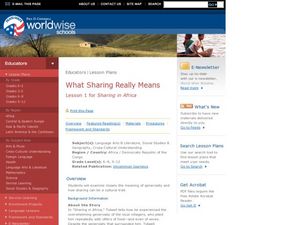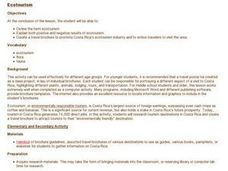Curated OER
Day 5 - Science Plants - germination - growth- What plants do we need to survive?
Students look at the crops of the settlers. In this crop lesson, students discuss why each crop was important to the settlers and how they used it. They plant seeds and track and observe the growth.
Curated OER
Describe How Money Barter, and Credit Were Used in Colonial Virginia
Fourth graders listen as the teacher lectures about bartering. They work in small groups to define and create a skit about one term related to bartering. Students create an Economic Terms booklet. They review that tobacco was a cash crop...
Curated OER
Nuts About Peanuts
First graders explore peanuts. In this peanut lesson, 1st graders examine the parts of peanut plants and identify them. Students plant their own peanut plants and chart their growth.
Curated OER
Rice Plantation
Eighth graders study the importance of rice as a cash crop and the crop's dependency on slave labor during the settlement of coastal South Carolina. They explain the importance of the rice plantations to South Carolina's colonial economy.
Curated OER
A "Sweet" Lesson in Economics
Students discover how to determine the flavor of a jellybean using different key documents. In this economics lesson, students discuss Virginia economics and begin an activity in which they will help decide on the what jellybean...
Curated OER
Seeing Things From the Someone Else's Point of View
Learners attempt to see the world from someone else's perspective. In this Peace Corps lesson, students read "Sharing in Africa." The piece challenges readers to consider how show respect for the cultural values of others while not...
Curated OER
What Sharing Really Means
Students examine the meaning of generosity and how sharing can be a cultural trait. In this cultural trait lesson, students read a text about the culture of generosity in Africa. Students complete a discussion activity and journal activity.
Curated OER
I Wonder Where The Manduca Came From...
Students examine how the Manduca came to America the economic means that made it possible. They discover what frass is and make observations. They make their own speculations on why the Manduca came to America.
Curated OER
Comparison of American Colonies
Students explore the lifestyles of the American colonies. They conduct various activities according to their grade level including jigsaw research and creating a poster. Lesson includes primary source readings related to the topic.
Curated OER
Kensington Mansion: Plantation, Sharecroppers, Tenants
Eleventh graders investigate the significance of the Kensington Mansion. In this South Carolina history lesson, 11th graders take field trips to the mansion and research primary and secondary sources about plantations, sharecropping, and...
Curated OER
Agricultural Hard Times And The Great Depression 1920 - 1930, Screen 5 and 6
Students study the interaction between the inhabitants of the state of Utah and its geographic features. In this Utah geography lesson, students determine how the geographic feature of Utah affected it settlement, land use and...
Curated OER
What is the history of rice in the United States?
Fifth graders become familiar with the history of rice and create a board game. In this rice lesson, 5th graders understand the history of rice through the playing of a game. Students use vocabulary words related to the...
Curated OER
Seeing Things From the Someone Else's Point of View
Young scholars examine the cultural trait of sharing, trying to view it from the point of view of someone in another culture. They question what we gain from trying to see the world from the perspective of another person or culture and...
Curated OER
Using a Mentor Text to Develop a New Style of Writing
Students examine some of the author's writing traits and then make an effort to incorporate his style into their own writing. They show how richly written literature can be used as a mentor text, or model, for improving one's own writing.
Curated OER
What Sharing Really Means
Students read the story "Sharing in Africa". As a class, they brainstorm a list of holidays and celebrations in various cultures and identify the Congo on a world map. To end the lesson, they focus on one paragraph of the story,...
Curated OER
Drought, nomads and the price of peanuts
Students read two short text items, which describe different approaches to agriculture. They describe the likely advantages and disadvantages of each approach for farmers, commercial peanut buyers, the government, nomadic herdsman and...
Curated OER
Leaf - It's What's for Dinner
Students discover correlations in food preferences of invertebrates, and assess stream health through use of kicknets, invertebrate keys, CBL systems and probes.
Curated OER
Ecotourism
Students create a brochure with the perfect vacation to Costa Rica in mind. They make sure that the brochure includes environmentally responsible tourism (ecotourism) after brainstorming what might or might not be included.
Curated OER
Farming the Southern Colonies
Seventh graders investigate the basis for farming choices in the early colonies by using group research and discussion. Each group researches a topic that they write about and present to the rest of the class.
Curated OER
Arkansas Regions As They Relate To Slave Population
Fifth graders evaluate how the characteristics of Arkansas' regions affect the slave population.
Curated OER
Utah Becomes a State—1890
Pupils read about and discuss the geography and statehood of Utah. In this Homestead Act lesson, students read the Homestead Act and discuss its effects. Pupils analyze a precipitation map and work in pairs to answer discussion questions.
University of California
The History Project: New Harmony an Experimental, Cooperative Community
The 1820s were a crucial period in our history. Much of the foundation of our modern industrial society was laid during this time. It was an era of optimism and prosperity, but also of social tensions and anxieties. The economy expanded...
Library of Virginia
Virginia Memory: Tobacco Counterblast
In this lesson, students look at why King James I thought that smoking tobacco was a dangerous habit.






















